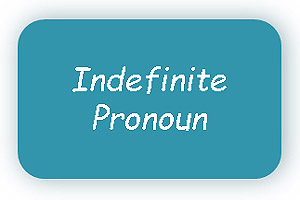Indefinite pronouns:
Indefinite pronouns do not identify particular people or objects, in contrast to their definite counterparts. Rather, they behave more like enigmatic partygoers, cloaked in uncertainty. Consider the words “someone,” “anything,” and “everything”; they imply possibilities and allude to unspecified amounts or unnamed people. These linguistic chameleons might be positive (“someone will help”) or negative (“nobody knows”), singular (“everyone is happy”) or plural (“some have doubts”). They give our words more flow and mystery, keeping the reader guessing and the meaning undefined. Thus, keep in mind that when you come across an indefinite pronoun, it’s not just about the unknown; it’s also about the possibility of surprise and an almost limitless range of options.
Indefinite pronouns, those enigmatic characters in the grammatical world, give our writing a mysterious, flexible quality by allocating certain persons, objects, or numbers to them. But to use them properly, you have to know their special laws and regulations. Let’s investigate these linguistic chameleons’ mysteries.
Singular or Plural:
Counting them is probably the most important rule. Certain indefinite pronouns (“anyone,” “each,” “nobody”) are always singular, but depending on the situation, other indefinite pronouns can be either. The terms “some” and “any,” for instance, can be used as single or plural (e.g., “Some milk is left”) (“Some people were late”). Be aware of their context: they are plural if they indicate a plural group (“many students are excited”), but they are single if they refer to a solitary noun (“everyone loves ice cream”).
Subject vs. Object:
Similar to their definite equivalents, indefinite pronouns can have various functions inside a phrase. They need single verbs (“Everything is beautiful”) as subjects. They assume their proper position as objects (“I saw someone interesting”). Recall that the verb (“everyone enjoys their hobbies,” not “Everyone enjoys their hobby”) must agree with the number of the pronoun, not the noun it may imply.
Agreement:
Use singular pronouns to refer back to indefinite pronouns (“Someone left their phone).” It is situated on the table. On the other hand, you might want to use plural pronouns (“Everyone shared their thoughts”) if the indefinite pronoun refers to a mixed-gender group. The solutions offered were either gender-neutral (“everyone brought their dish”) or diverse and perceptive. It was a very tasty potluck.
Not specific pronouns often convey a negative meaning. “Nobody came,” for example, suggests total nonexistence. “Nobody didn’t answer” is a double negative that should be avoided. Rather, capitalize on the negative connotations that come with pronouns like “nobody,” “no one,” or “nothing.”
Exploring Special Cases:
Some indefinite pronouns have unique quirks. “Either” and “neither” typically require singular verbs and singular pronouns (“Either of them is welcome. They should bring a dish.”). “Both” can be singular or plural depending on the context (“Both teams won their games” vs. “Both shoes were muddy”).
The Power of Indefinite Pronouns:
Indefinite pronouns offer a powerful tool to add nuance and possibility to your writing. By understanding the rules and conditions, you can harness their ambiguity to create suspense, highlight unknown quantities, or keep your reader guessing. So, step into the shadows with confidence, and let these linguistic mysteries elevate your writing to new heights.
Some of the conditions are:
1). Do not introduce a clause.
2). Words ending one or the other are used for people.
3) Words ending in – thing are used for things.
- One
- Everyone
- Everybody
- Others
- Each
- Some
- Someone
Singular and Plural forms of Indefinite Pronoun
| Singular | Plural | Both singular and plural |
| Any Body | Others | Some |
| Each | Both | None |
| Nobody | Many | Such |
| Everyone | Few | Any |
| Little | Several | More |
| Everything | All |
Indefinite pronoun examples:
- Each athlete is trying to beat his competitor’s team.
- Everyone is happy on convocation day.
- Everything is ready according to strategy.
- Has anyone a guitar for today’s party?
- Both are willing to participate in the competition.
- Many children are not going to school picnics.
- Several employees are absent today.
- Some people are not interested in government policies, / some are good.
- None of them are ready to go to today’s party/None is coming on my birthday.
- All students passed with remarkable marks. All information is incorrect.

